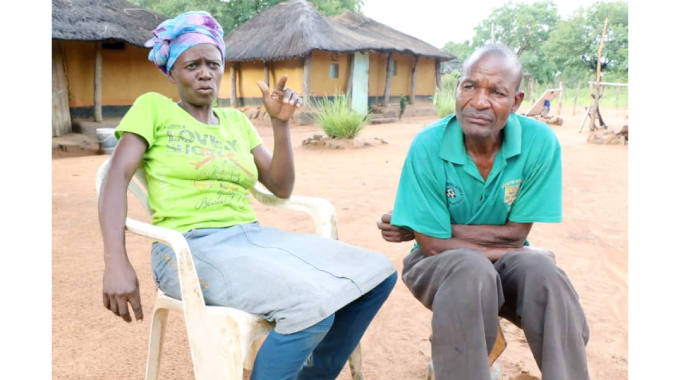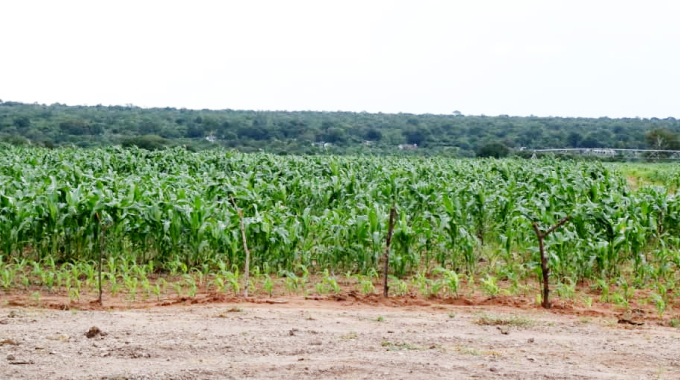The Chronicle

Nqobile Tshili, Chronicle Reporter
DECEMBER 23, 2021, will forever be etched in the minds of Mpofu villagers in Lupane, Matabeleland North, following their payout for working at the Bubi-Lupane Irrigation Scheme managed by the Agricultural and Rural Development Authority (Arda).
President Mnangagwa launched the Bubi-Lupane Irrigation Schemes late last year which was identified as a pilot project for an integrated business model to be replicated across all provinces in the country as part of the National Food Security Strategy .
The villagers had been working at the irrigation scheme where they planted and harvested wheat. Now the scheme has a thriving maize crop pointing to another good harvest and more income for the villagers.
The villagers yesterday told a Chronicle news crew how their lives had changed since they joined the irrigation scheme.
Bubi-Lupane Irrigation Scheme vice secretary Mrs Sikhulile Ndlovu said her community had been living in poverty before they joined the irrigation scheme.
She said when she decided to join the scheme, she did not expect to make meaningful earnings from the project.
“The irrigation was revived at the beginning of last year and I was sceptical of joining since it had not been functional for years.
We first planted millet and the crop failed and that dampened our spirits.
Thereafter, we started working on the winter wheat crop and got our payouts in December,” said Mrs Ndlovu.
Mrs Ndlovu said she is confident that when they harvest the maize crop, they will be able to add more household furniture and even buy livestock.
 Mrs Sikhulile Ndlovu and her husband Michael narrate how they have benefited from Bubi-Lupane Irrigation Scheme in Matabeleland North yesterday
Mrs Sikhulile Ndlovu and her husband Michael narrate how they have benefited from Bubi-Lupane Irrigation Scheme in Matabeleland North yesterday“We are in the process of building a modern house. We want to demolish these mud and pole huts that we have. I have already bought building materials such as cement, door frames, window frames and a perimeter fence which I will install at my homestead.
All this I have managed to buy through my involvement in the irrigation scheme. Some of the villagers have even managed to buy cattle and I believe if you have two beasts you can be able to add three more when we harvest maize,” said Mrs Ndlovu.
She said some villagers started coming in their numbers after realising how much they earned from their previous harvest.
Her husband Mr Michael Ndlovu said villagers from Mpofu were considered to be very poor, but the success of the irrigation project was now changing that narrative.
Mr Ndlovu said while he does not work at the irrigation, he bears witness to its success.
“I don’t think we were ever going to be able to acquire what we have if it was not for the irrigation. I complement my wife by working at home while she works at the irrigation. I’m in charge of farming at home so the crops that you see here were all done by me as there is a need for someone to take care of business at home,” said Mr Ndlovu.
He said there had been a reduction in domestic disputes due to improved financial positions of various households in the village.
Another member of the irrigation scheme Mr Ntshingelani Mlotshwa (48) said he is also going to build a new home following the payment he got from their partnership with Arda estate.
“I am a builder by profession, but nothing has compared to farming. When we received our payments on 23 December, our lives were transformed. I was living in poverty, but not anymore. Soon I will be building a new house, whose plan has already been approved by council. It won’t be an ordinary house, as I will roof it using tiles. Farming is the way to go and I recommend anyone to join this programme,” said Mr Mlotshwa.
 Bubi-Lupane Irrigation Scheme in Matabeleland North
Bubi-Lupane Irrigation Scheme in Matabeleland NorthHe said he’d managed to buy a new wardrobe, bed, kitchen unit, utensils and clothing for his family
Mr Mlotshwa said they do not just get payment for providing labour, but they are also given part of the harvest to feed their families.
Arda chief executive officer Mr Tinotenda Mhiko said involvement of communities in irrigation programmes speaks to the estate’s aim of rural development in line with the national vision.
He said Arda was replicating the Bubi-Lupane Irrigation Scheme across 450 irrigation schemes across the country with the aim of alleviating poverty.
“Apart from being shareholders of the schemes receiving dividends after every cropping season, the householders are gainfully employed by the same scheme.
Inevitably, we can safely say that our programmatic interventions are an enabler, in our own small way, for the realisation of the benchmarks as set out in Vision 2030 and National Development Strategy 1,” said Mr Mhiko.
“By radically migrating from from subsistence farming, we are now focusing on surplus oriented agricultural output. Inevitably, therefore, an empowered upper middle-income economy by 2030 is attainable.” – @nqotshili.
Article Source: The Chronicle
